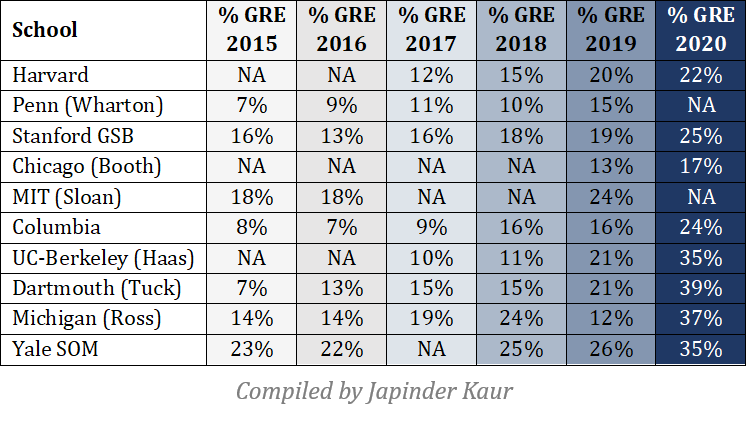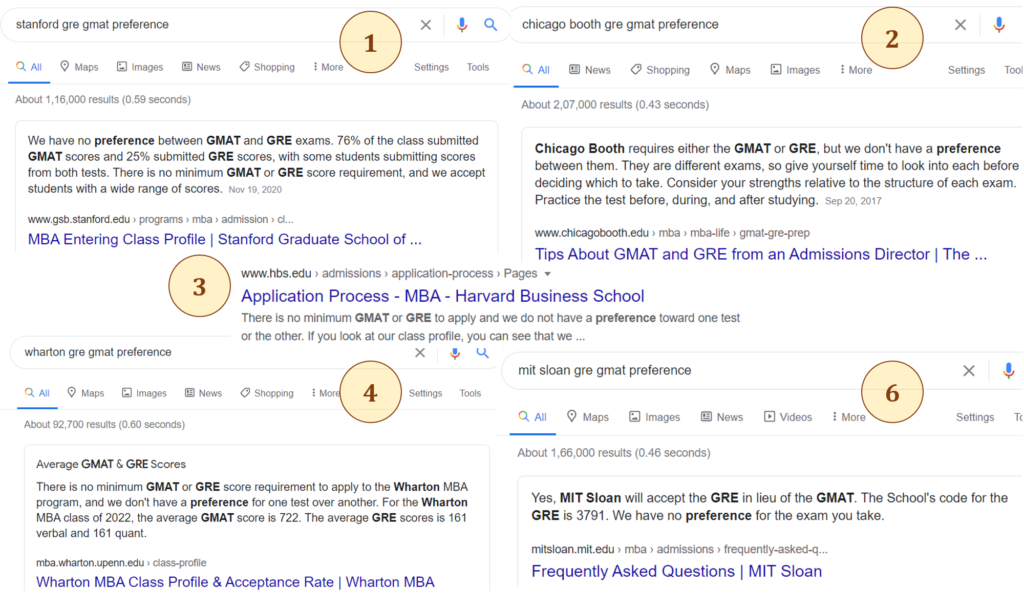Do business schools favor GMAT applicants over those who submit GRE scores?
Anu’s Story
An MBA aspirant – let’s call her Anu – reached out to me on LinkedIn with this question some time back.
She had switched to the GRE after scoring a 670 in the GMAT, because she felt more comfortable with the GRE and thought that her chance of getting an elite score was better with this test. However, now – when she had already invested more than a month in GRE prep – some online articles that advised business school aspirants to stick to the GMAT had made her anxious that the switch may have been a mistake.
I suggested that she ask this question directly from her target schools. She did this; all but one of those schools – her list included Stanford, London Business School, Yale, Rotman and Ivey – replied that she should take the test that suited her strengths; what mattered to them was not the choice of test between the GRE and the GMAT but a high score (per their requirements) in the chosen test. Tepper was the only school she wrote to that preferred the GMAT.
Feeling more confident now, Anu decided to continue with the GRE. And thus, her short story of confusion between the GRE and the GMAT reached a happy ending. However, our conversation had sparked off my interest in the matter. I continued to probe it further and came across students on different forums (Quora, GRE Prep Club, Reddit et al) who were flustered by the same doubt that had troubled Anu.
Through this article, I hope to provide a fact-based and up-to-date answer to this question. I will:
- present a statistical overview of the increasing acceptance of GRE at American business schools, based on two sources –
- Kaplan Test Prep annual surveys and
- Poets and Quants – and
- share my own search results for the stance of Tier-1 business schools regarding the GRE.
So, let’s get started!
An Overview of GRE Adoption Trends
Kaplan Test Prep Surveys
Kaplan Test Prep conducts annual surveys of business school admissions officers. 2009 was the first year when the surveyed business schools were asked if they accepted GRE scores. Only 24% of the schools had said ‘Yes’ then. By 2020, this number had grown to a whopping 96%.
The findings about GRE acceptance from the 2016, 2019 and 2020 surveys are tabulated below:

Assuming that this survey is a fair representation of all business schools in the United States, we learn from it that almost nine out of ten business schools today treat the GRE on par with the GMAT.
Poets&Quants Business School Data Compilations
Another data-rich resource that I found to be useful in my research was the Poets and Quants website (abbreviated henceforth as P&Q). The following table is based on data from this and this article and shows the year-wise GRE percentage for the top business schools in the United States.
GRE percentage means ‘the percentage of all admitted students who submitted a GRE score’ and will be abbreviated henceforth as ‘%GRE’.

(NA: Not Available; not all schools make their GRE percentage public, and some schools that usually do publish this data point choose not to do so in some years, for unspecified reasons.)
This table shows that the percentage of admitted students who got in with GRE scores has been increasing at the top MBA programs of America, in some cases considerably, and now ranges from 17% to a huge 39%.
The strides made by the GRE are even more significant in lower-ranked schools. For example, the 2020 % GRE figures for Washington Olin (P&Q Rank 29) and Georgetown McDonough (Rank 24) are 71% and 54% respectively.
The absence of Kellogg (ranked in 2020 at #3 by U.S. News and #5 by P&Q) from the above table may have surprised you. I deleted Kellogg’s row because it added no information- this was the only school that did not share its % GRE data for any year between 2015-2020. However, this does not mean that Kellogg loves the GRE less; the school website clearly states that the school has no test preference:

Should YOU take the GRE?
The data shared above suggests that most American business schools today are impartial between the GMAT and the GRE.
However, to be fully confident about your choice of the GRE for MBA applications, you should do what Anu did – find out what the programs you will be applying to say on the matter.
A simple internet search may give you the answers. For example, I could find the stance of all top business schools of the US (as per the P&Q Ranking 2020-2021) with a Google search. Among these, Kellogg ranks #5 and you have already seen the website snippet showing the school’s view of the GRE. For the other schools in the top 6, the search results are below (along with the P&Q Rank of the school):

You may also find interviews or blogposts from the admissions officers of your target schools where they clarify their schools’ policy regarding GMAT and GRE. You could also email your query to them.
These methods are forms of hearing from the horse’s mouth. When you can do these, why spend your time and mental energy on speculative points-of-view posted on test prep websites?
Caution: Do not infer what the stats don’t say
I also want to point out that a trend of year-on-year increases in %GRE for a business school is not sufficient evidence to infer that the school is neutral between the GRE and the GMAT. For example, look at the year-wise figures for Tepper School of Business:

A student who was applying to Tepper in 2019 with GRE scores may have felt confident that the steady uptick in %GRE from 2015 indicated the school’s increasing receptivity to the GRE score. However, when Anu wrote to them, this was the only school to say that it still prefers the GMAT.
Conclusion
The data shared in this article corroborates the claim that the GRE is treated on par with the GMAT at most business schools today.
So, if you are an MBA-aspirant who:
- has been struggling with the GMAT for a while and
- does not have a fixed list of target business schools,
switching to the GRE would most likely have no adverse impact on your chances of success; at worst, what might happen is that one of the schools you are thinking of applying will tell you that they prefer the GMAT, and if that happens, you might choose either to still take your chances and apply to that school with your GRE score or to drop that school altogether.
If you do have a list of ardently dreamed about schools, then you should simply check (from primary sources, not from hearsay) the stance of these schools regarding the GRE. If they all tell you that they are impartial, then trust them on it. The schools have no incentive to lie to their prospective applicants. Believe what they tell you, and do not fall for the misinformation/rumors/speculation that abounds on the internet and waste your time and energy on second-guessing your choice of test, like Anu did. And, if one or two schools in your dream-list tell you that they prefer the GMAT, then drop your GRE plans and put your heart and soul into performing better on the GMAT.
I hope that through this article, you are able to make a confident choice of standardized test for your MBA applications and, thereafter, devote all of your attention to preparing for the thing that really matters: a great score.
Further Reading:
- Does low GRE percentage at a business school imply GMAT preference?
- Are the following claims true?
- The GMAT is the safer choice because business-school admission committees are more familiar with this test.
- Submitting GRE scores signals weak intent for MBA.
Written by Japinder Kaur; also published on LinkedIn.